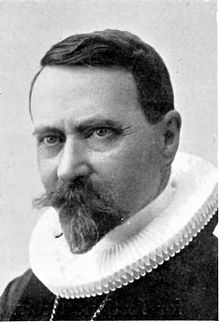Johan Nicolai Støren
| Johan Nicolai Støren | |
|---|---|
 |
|
| Personal details | |
| Born |
22 July 1871 Trysil, Norway |
| Died | 14 November 1956 (aged 85) Oslo, Norway |
| Nationality | Norwegian |
| Denomination | Christian |
| Parents | Abraham Wilhelm Støren Lagertha Johanne Diriksdatter |
| Occupation | Priest |
| Education | cand.theol. (1895) |
| Alma mater | University of Oslo |
Johan Nicolai Støren (22 July 1871 – 14 November 1956) was a Norwegian bishop and theologian.
Støren was born in Trysil, Hedmark county, Norway, the son of vicar Abraham Wilhelm Støren and his wife Lagertha Johanne Diriksdatter. He had eleven siblings, including the brother Kristoffer Støren and a first cousin of engineer Ragnvald Støren. His first cousin Petter Johan Nicolay Støren was the father of high-ranking Nazi civil servant Finn Støren, making Johan and Finn first cousins once removed.
He was sent to Kristiania Cathedral School at age 13, and took his examen artium in 1889. He then graduated from the Norwegian Military Academy in 1890 and from the Royal Frederick University with the cand.theol. degree in 1895. He studied in Germany from 1898 to 1899. He started his pastoral career in 1896 as curate serving under his vicar father in Meldal, not far from Støren where his family originated. After the period in Germany, Støren was vicar in Brønnøy and Skjerstad between 1899 and 1901, seaman's priest in Leith, Scotland from 1901 to 1908 and then as a curate in Biri from 1908 to 1913. From 1913 he was the vicar of Tynset, and in August 1915 he was promoted to dean of Østerdalen. There were tumultuous times for the church, with conservatives protesting the growing influence of liberals. Støren was slightly on the conservative side, but was a compromise candidate for Bishop of the Diocese of Hålogaland in 1918. Støren was originally the fourth-most favored candidate among the local clergy, but the favored candidate Johan Beronka was a pacifist Kven and therefore out of the question for the Council of State (who appoints bishops in Norway), number two rejected the offer and number three was seen as too liberal. He was appointed in July and ordained in September 1918. He remained here until being appointed as the more prestigious Bishop of the Diocese of Nidaros in 1928.
...
Wikipedia
